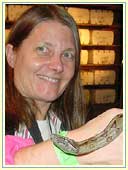|
 |
Shauneen
Giudice
|
"Hi, I'm
Shauneen Giudice. I'm the seventh grade science teacher at Delmar
Middle and Senior High School in Delmar, Delaware.
Have you ever
wondered what kind of impact you make on the planet Earth? That's
one of the questions we explore in my science classes, and now that I
have a chance to explore it in person — you're invited
to join me!
An ecosystem involves the relationship of living organisms with each other and with
their physical environment, which means that every living thing can
have an affect on other living things around them. In fact, we are all part of an ecosystem.
Can you think of an ecosystem in your own home, yard, or school?
What is the physical environment like in these places? What types
of plants and animals live there? Ecosystems can become endangered for many reasons. One example might be a climate changes, like a drought that lasts for a long time, or
if a new predator threatens the amount of food available for other
animals. Human activity also affects these systems. In many places,
people are cutting down forests for agriculture, wood, and other
uses. The removal of the trees destroys important animal habitats, can lead to soil erosion, effect the water in the streams and wetlands, and even have an effect on global climate systems.
In this project,
we are going to look at two specific ecosystems, a tropical dry
forest in Mexico and a lowland, tropical rain forest in Costa Rica.
I'll be part
of the Earthwatch research team in Costa Rica, where we will look at how caterpillars have adapted to their
environment in order to survive. After hearing so much about tropical
rain forests, I'm anxious to actually see one for myself and to
work with scientists who are studying the plants and animals out
in the field. One of the most exciting things will be getting to climb
up into the canopy to collect caterpillars and to help with the
experiments to find out what they eat and how they defend themselves
from predators. At the end of our expedition, you'll get a chance
to interview me about my experiences in Costa Rica, and I will answer all your questions.
The other project
takes place in the tropical dry forest of Mexico. You will meet
biologist Dr. Carlos López González and Earthwatch team members
as they track wild cats and other mammals to learn how these animals
interact and what they need to survive.
Are you ready
to get started? Your mission for this project is to learn about
endangered ecosystems, wild cats and caterpillars, learn about Earthwatch's
work in the field, and do your own research. Click on the link below
to accept your mission and get started!"
|
